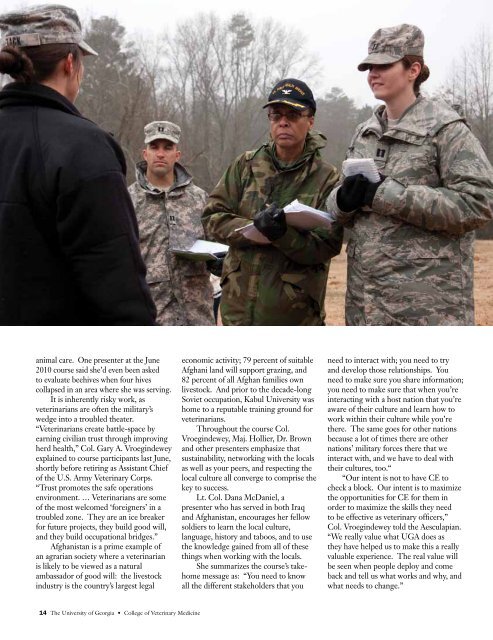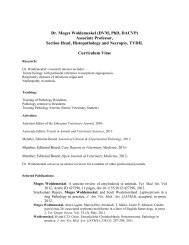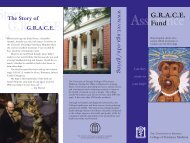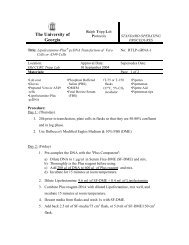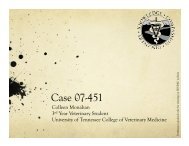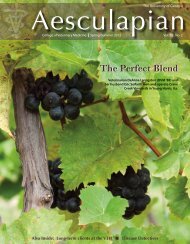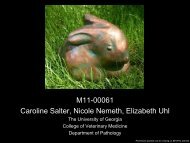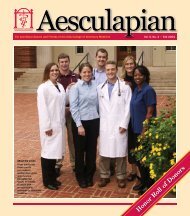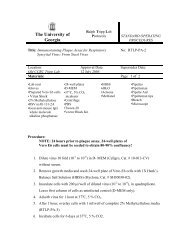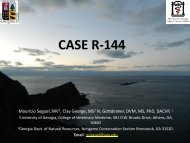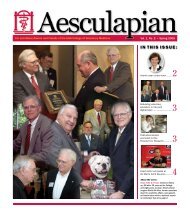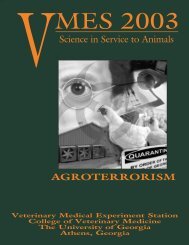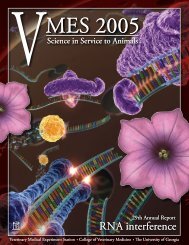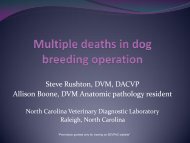Winter/Spring 2011 Aesculapian magazine - University of Georgia ...
Winter/Spring 2011 Aesculapian magazine - University of Georgia ...
Winter/Spring 2011 Aesculapian magazine - University of Georgia ...
Create successful ePaper yourself
Turn your PDF publications into a flip-book with our unique Google optimized e-Paper software.
animal care. One presenter at the June<br />
2010 course said she’d even been asked<br />
to evaluate beehives when four hives<br />
collapsed in an area where she was serving.<br />
It is inherently risky work, as<br />
veterinarians are <strong>of</strong>ten the military’s<br />
wedge into a troubled theater.<br />
“Veterinarians create battle-space by<br />
earning civilian trust through improving<br />
herd health,” Col. Gary A. Vroegindewey<br />
explained to course participants last June,<br />
shortly before retiring as Assistant Chief<br />
<strong>of</strong> the U.S. Army Veterinary Corps.<br />
“Trust promotes the safe operations<br />
environment. … Veterinarians are some<br />
<strong>of</strong> the most welcomed ‘foreigners’ in a<br />
troubled zone. They are an ice breaker<br />
for future projects, they build good will,<br />
and they build occupational bridges.”<br />
Afghanistan is a prime example <strong>of</strong><br />
an agrarian society where a veterinarian<br />
is likely to be viewed as a natural<br />
ambassador <strong>of</strong> good will: the livestock<br />
industry is the country’s largest legal<br />
economic activity; 79 percent <strong>of</strong> suitable<br />
Afghani land will support grazing, and<br />
82 percent <strong>of</strong> all Afghan families own<br />
livestock. And prior to the decade-long<br />
Soviet occupation, Kabul <strong>University</strong> was<br />
home to a reputable training ground for<br />
veterinarians.<br />
Throughout the course Col.<br />
Vroegindewey, Maj. Hollier, Dr. Brown<br />
and other presenters emphasize that<br />
sustainability, networking with the locals<br />
as well as your peers, and respecting the<br />
local culture all converge to comprise the<br />
key to success.<br />
Lt. Col. Dana McDaniel, a<br />
presenter who has served in both Iraq<br />
and Afghanistan, encourages her fellow<br />
soldiers to learn the local culture,<br />
language, history and taboos, and to use<br />
the knowledge gained from all <strong>of</strong> these<br />
things when working with the locals.<br />
She summarizes the course’s takehome<br />
message as: “You need to know<br />
all the different stakeholders that you<br />
need to interact with; you need to try<br />
and develop those relationships. You<br />
need to make sure you share information;<br />
you need to make sure that when you’re<br />
interacting with a host nation that you’re<br />
aware <strong>of</strong> their culture and learn how to<br />
work within their culture while you’re<br />
there. The same goes for other nations<br />
because a lot <strong>of</strong> times there are other<br />
nations’ military forces there that we<br />
interact with, and we have to deal with<br />
their cultures, too.“<br />
“Our intent is not to have CE to<br />
check a block. Our intent is to maximize<br />
the opportunities for CE for them in<br />
order to maximize the skills they need<br />
to be effective as veterinary <strong>of</strong>ficers,”<br />
Col. Vroegindewey told the <strong>Aesculapian</strong>.<br />
“We really value what UGA does as<br />
they have helped us to make this a really<br />
valuable experience. The real value will<br />
be seen when people deploy and come<br />
back and tell us what works and why, and<br />
what needs to change.”<br />
14 The <strong>University</strong> <strong>of</strong> <strong>Georgia</strong> • College <strong>of</strong> Veterinary Medicine


